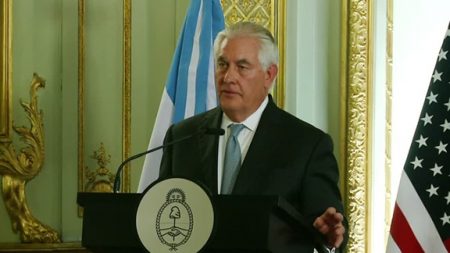After decades in which the United States largely looked the other way, the Trump administration has decided to confront China over its growing influence in Latin America. Trouble is, you can’t win over Latin American countries if you’re constantly insulting them.
In a Feb. 1 speech on Latin American affairs, U.S. Secretary of State Rex Tillerson said that China is trying to “pull the region into its orbit, and that “Latin America does not need new imperial powers.”
Furthermore, in a major shift in U.S. policy toward Latin America, Tillerson told an audience in Austin, Texas, that the Monroe doctrine — a 19th-century U.S. policy that effectively warned extra-regional powers to stay away from Latin America — is “as important today as it has ever been.”
The Obama administration had declared the Monroe doctrine obsolete. The United States invoked it to justify military interventions in the 19th and early 20th centuries, although recent U.S. administrations interpreted in gentler ways.

In his speech, Tillerson said that Latin America is “a priority for the United States,” and that “we have a historic opportunity” to improve hemispheric relations. He suggested that, unlike China, “we do not seek short-term deals with lopsided returns” in the region.
There is no question that China is gaining ground in Latin America. While Latin America bought 50 percent of its total imports from the United States in 2000, that percentage has gone down to only 33 percent today. Meantime, China’s share of Latin America’s imports grew from 3 percent to 18 percent during the same period, according to an Inter-American Development Bank study.
But what Tillerson won’t say is that the Trump administration is directly responsible for worsening U.S.-Latin American ties over the past year. Trump’s approval rate in the region, on a scale of 0 to 10, is at an all-time low of 2.7, according to a recent Latinobarometro poll.
Tillerson’s conciliatory speech was in sharp contrast with Trump’s dark vision of Latin America as a source of drugs, unfair trade practices, illegal immigrants and “bad hombres.”
Trump’s signature project is a wall on the border with Mexico, which he routinely justifies with a narrative that demonizes Mexican and Central American immigrants as people who bring crime and drugs to the United States. In Trump’s world, there seem to be no good Latin American immigrants.
Just recently, he falsely tweeted that Mexico is the most dangerous country in the world and was quoted as saying that El Salvador and Haiti are “shithole countries.” That’s hardly a recipe to improve ties with Latin America.
In addition, Trump has withdrawn from the Trans-Pacific Partnership trade agreement, and threatens to withdraw from the North American Free Trade Agreement with Mexico and Canada. He also ordered the deportation of hundreds of thousands of Salvadoran and Haitian refugees, and has called for the expulsion of nearly 800,000 “DREAMers,” or young people raised in the United States, but who were brought here as young children by undocumented parents.
While Trump is insulting Latin Americans, the Chinese are courting them. President Xi Jinping has visited the region three times during the past four years, while Trump has not set foot in the region. Likewise, China’s foreign minister Wang Yi has made two trips to South America during the past 15 months, while Tillerson is making his first trip to South America this week.
It’s not surprising that Chilean foreign minister Heraldo Munoz told me last month, hours before a meeting of 25 Latin American foreign ministers with Wang, that, “There is a vacuum of U.S. leadership in Latin America, and China is taking advantage of it.”
If Tillerson really wants to improve ties with Latin America, he should tell his boss to come up with a positive agenda for the region, and to stop insulting its people. If you call your neighbours “shithole countries,” threaten to withdraw from trade agreements and wrongly claim that most undocumented immigrants coming from the southern border are “criminals” and “rapists,” you shouldn’t be shocked when countries in the region welcome the Chinese with open arms.











